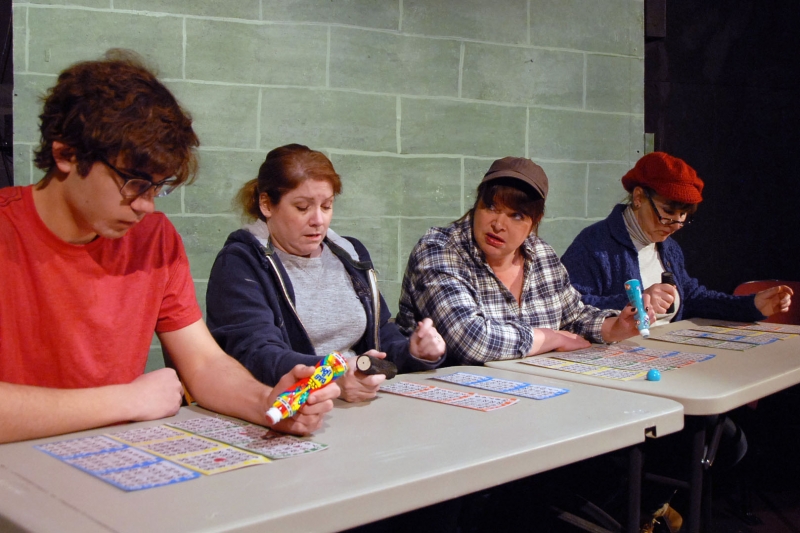The adjective "good" is tossed around several times in the spellbinding production of Good People performed by the Chester Theatre Group. Dr. Michael Dillon (aka "Mikey" to his pals in South Dorchester, Boston) is said to come from "good people," meaning people one can count on to support their friends and family. Margie Walsh, single mother of a severely retarded adult daughter and facing eviction, is called " good," as in "nice," by her friend Jean because she hesitates to fudge the truth in an effort to find employment after she's fired from her cashier's job for excessive tardiness. By the end of the play, however, the term has become ironic, and nothing seems to be what it appears.
The 2011 production of this play by David Lindsay-Abaire was nominated that year for two Tony Awards, with Frances McDormand as Margie winning one. At the Manhattan Theater Club, it was performed on a traditional stage with a proscenium arch; transferring it to the in the round playing space of the little Black River Playhouse gives the production an immediacy, an intimacy so sharp that our feeling of being voyeurs gives the play an added edge.
The tale of two Americas, to quote the politicians, is front and center in Good People, but here it encompasses culture as well as economics. Both Margie and Michael come from Southie, a blue-collar section of Boston. An old flame of Margie's, he has made it "out," leaving the projects to go to the University of Pennsylvania and medical school to become a reproductive endocrinologist with a family and a house in the fancy neighborhood of Chestnut Hill. Margie has not been so fortunate. She claims his success was due to having a father who pushed him; he claims that her current financial problems are her own fault for not trying hard enough. When she barges into Mike's office and later his home seeking employment, the question of class loyalty raises its ugly head, resulting in a culture clash wherein both Margie and Mike show that they are not really "good" people; they're merely human.
Director Cindy Alexander keeps a firm hand on the proceedings so well that we would swear we are eavesdropping on actual conversations, squabbles and outright argument. The scenes in Southie between Margie, her friend Jean and landlady Dottie are almost leisurely, chatty, in direct contrast to the tightly wound, more contentious scenes between Margie and Mike and his wife Kate in the second act.
 Other than some problems with the consistency of maintaining a South Boston accent, the cast is uniformly fine. As Margie (pronounced with a hard g), Gloria Lamoureux has just the right mix of feistiness and niceness that doesn't allow her to follow through. She tries to emotionally blackmail her boss Stevie by insulting him, but takes it back when he's outraged at her insinuations. She is, as Mike calls her, passive aggressive, pushing his buttons but conceding defeat easily. As her landlady Dottie, Ellen Fraker Glasscock is dotty—a real busybody and noodge, totally unreliable and making excuses for her behavior. Claudia Metz's Jean is "the mouthie from Southie," full of opinions and very outspoken. And George Bierly as Stevie, Margie's boss, puts a rod of steel into his young back, refusing to back down when Margie tries to shame him into keeping her on the dollar store payroll. (L-R: George Bierly, Gloria Lamoreaux, Claudia Metz, Ellen Fraker Glasscock)
Other than some problems with the consistency of maintaining a South Boston accent, the cast is uniformly fine. As Margie (pronounced with a hard g), Gloria Lamoureux has just the right mix of feistiness and niceness that doesn't allow her to follow through. She tries to emotionally blackmail her boss Stevie by insulting him, but takes it back when he's outraged at her insinuations. She is, as Mike calls her, passive aggressive, pushing his buttons but conceding defeat easily. As her landlady Dottie, Ellen Fraker Glasscock is dotty—a real busybody and noodge, totally unreliable and making excuses for her behavior. Claudia Metz's Jean is "the mouthie from Southie," full of opinions and very outspoken. And George Bierly as Stevie, Margie's boss, puts a rod of steel into his young back, refusing to back down when Margie tries to shame him into keeping her on the dollar store payroll. (L-R: George Bierly, Gloria Lamoreaux, Claudia Metz, Ellen Fraker Glasscock)

Steve Catron's set evokes Southie and Chestnut Hill neighborhoods very well, especially with the props assembled by Barbara Haag, Beth Gleason and Karen Catron. Jeff Knapp's sound includes appropriate music, and Phil Lamoreaux's lighting enhances the various locales.
Lindsay-Abaire has written a play full of secrets and surprises. A stray, off-hand remark made in the final scene will have you talking about the play long after the lights have gone down. Once again, Chester Theatre Group shows us why they are one of the finest community theaters in northern New Jersey. They are not afraid to tackle provocative plays, give edgy and polished performances, and make their audiences think.
From the carping squabbles through the more vociferous arguments, the characters in Good People are "good" and nice, petty and mean. Above all, they are human, and that makes them all the more interesting.
Good People will be performed at the Black River Playhouse, Grove Street, in Chester through March 30. For information and tickets call 908.879.7304 or visit online at www.chestertheatregroup.org.
